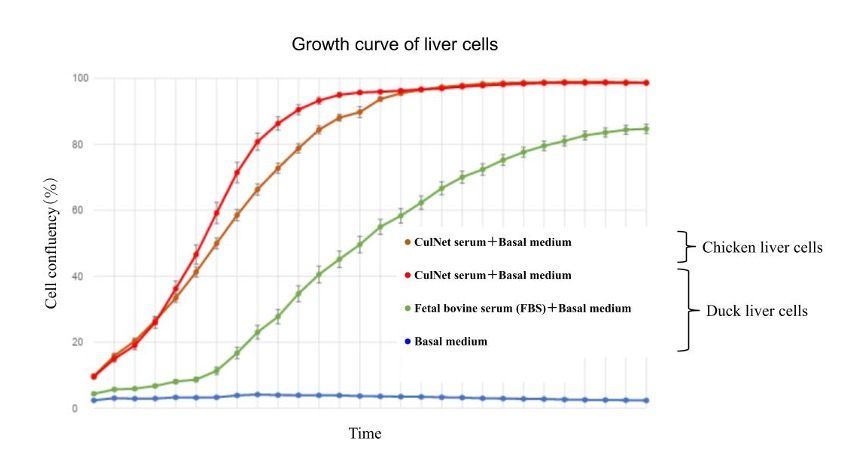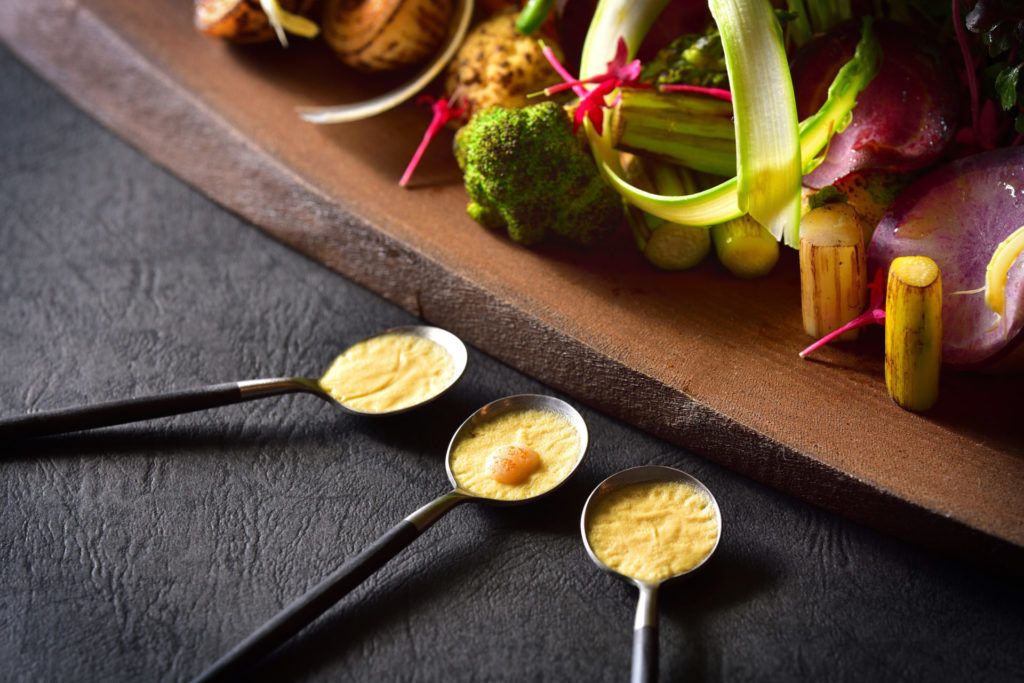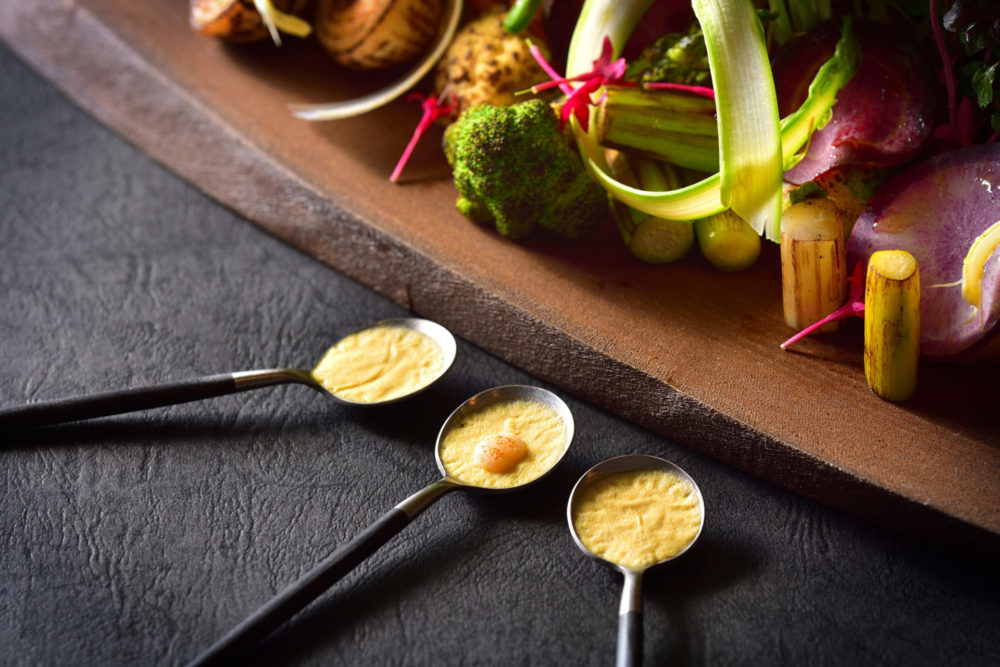Disclosure: AFN’s parent company, AgFunder, is an investor in IntegriCulture.
IntegriCulture has announced the commercial release of its basal medium which can be used to produce cultivated meat without the addition of animal-derived growth factors.
- The Japanese cellular ag startup has successfully swapped out all of the research-grade components of its medium, named I-MEM, with food-grade replacements – readying the product for commercial sale.
- It claims that food-grade I-MEM can be used to create cultivated meat and other cell-cultured products — such as cosmetics, materials, and biopharmaceuticals — at as little as one-sixtieth the cost of growth media which use animal-derived serum (that’s a cost reduction of over 98%.)
- IntegriCulture has used I-MEM within its CulNet bioreactor system to successfully culture chicken and duck liver cells into edible products.
- The team found that using serum-free medium produced by a given combination of different feeder cells led to faster proliferation of these liver cells compared to conventional medium containing 10% FBS, with cells doubling up to 2.5x faster (see chart below.)
- IntegriCulture aims to launch cultivated foie gras (fattened duck or goose liver), made using I-MEM and CulNet, as its first cell-cultured product later this year.

Why it matters:
In its early days, one of the major drawbacks of cultivated meat production has been its reliance on animal slaughter to source of growth factors – the main one being fetal bovine serum (FBS).
- FBS is extracted from the blood of cow fetuses after the slaughter of the mother animal for (conventional) meat. This extraction is an expensive process, making FBS costly for cultivated meat producers – and, by extension, contributing to the economic unviability of cultivated meat. (A single Eat Just chicken bite — the first cultivated meat product in history to get regulatory approval — reportedly costs $50 to produce.)
- Moreover, reliance on a byproduct of conventional meat production negates, to some extent, the ecological and ethical arguments made in favor of cultivated meat (that it is better for the planet, and for animal welfare, than livestock agriculture.)
- The availability of basal media and other components that do not rely on animal-derived factors can potentially bring down the costs of producing cultivated meat, making it more affordable to end consumers; while also ending the nascent industry’s reliance on slaughterhouses.
How it works:
The CulNet System uses I-MEM to proliferate and maintain cell cultures without animal serum by imitating an animal’s body.
- The system comprises several bioreactors which cultivate a variety of “feeder cells” from different organs in an animal body, along with a bioreactor for cultivating cells that will become the final product.
- Through “inter-organ interactions” the feeder cells secrete serum-like components such as albumin and transferrin, among others – removing the necessity to add animal serum or another source of these factors.
- IntegriCulture is working with clients, including food corporates and alt-protein startups, to design CulNet systems with feeder cells that are tailored to their specific needs.

The big picture:
Several other cell ag companies have announced that they’ve created solutions that bypass the need for animal-derived serum:
- Aleph Farms (Israel) has collaborated with Wacker to eliminate animal-derived serum from its process.
- Avant Meats (Hong Kong) uses “only animal-free components” for its production of cultivated seafood, according to a note from investment bank Jefferies.
- BlueNalu (US) has cultivated yellowtail fillets in a serum-free solution containing plant-derived proteins.
- CellMeat (South Korea) has developed CSF-A1, “a serum-free cell-culture medium exclusively for cultivated meat by CellMeat” that it claims can grow cells up to 250% faster than FBS-based media or alternative animal-free options.
- Eat Just (US) initially produced its aforementioned chicken bites using FBS in an effort to get to market more quickly than competitors, but claims to have developed, and since used, a “synthetic alternative.”
- Finless Foods (US) is cultivating bluefin tuna flesh using “completely serum-free media.”
- Future Meat (Israel) has developed its own animal-free growth media.
- Meatable (Netherlands) gets round the issue by using pluripotent stem cells that don’t need serum.
- Mosa Meat (Netherlands) cultivates beef and other meats “using growth media without any FBS, or any other animal products.”
- SuperMeat (Israel) avoids animal serum via its “unique” process which involves cells “proliferating under very precise conditions.”
- Upside Foods (US) said in December it now produces all of its cultivated meat without animal-derived serum.
What they say:
IntegriCulture founder and CEO Yuki Hanyu told AFN that I-MEM can be used as a direct replacement for traditional basal media, such as DMEM.
“I-MEM works with the CulNet System, I-MEM also works with traditional cell cultures that use FBS, and quite possibly with the animal-free supplements that other cell-ag startups may be developing,” he said.
“We are making the composition of I-MEM open as a scientific paper and selling it [as a B2B product] to provide more transparency for the industry, as well as ourselves.”





